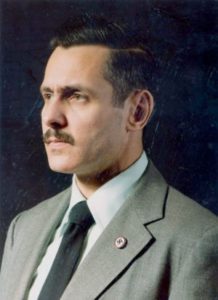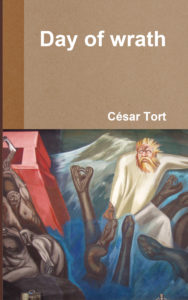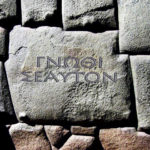Christian apologetics is a dishonest game of ignorance, according to New Testament scholar Dr. Richard Miller (five-minute YouTube clip here). They start with their conclusions and then they do the ‘research’.
Month: July 2023
Another book in PDF
In the featured post I said:
This is the migrant’s seventh and final step. He has finished crossing the river and is finally on dry land, albeit with his feet still wet in the damp, dark sand of the beach, even if he has a few more steps [emphasis added] to go before he touches dry, clear land.
Those steps, already on our side of the shore, are optional in that he who has crossed the Rubicon can continue to educate himself as he sees fit. Personally, it helped me to understand what has happened in North America, which is where I live (although south of the Rio Grande). That’s why I put together a new book which, for the moment, is only available as PDF: American Racialism from which I would like to quote the first pages:
______ 卐 ______
Editor’s Introduction
In his book Dominion, Tom Holland said that the most serious enemy of Christianity was National Socialism because no one—since Constantine—had challenged Christian morality as the Third Reich did. I agree with Holland and, accordingly, the first two pieces in this anthology touch the Christian Question.
The first is an abridged 2012 exchange between two Americans: Alex Linder and Brad Griffin, taken from Linder’s forum. In contemporary US racialism, Linder has been a fierce critic of Christianity. Griffin, on the other hand, is a Christian. Despite his anti-Christianity, Linder believes that the scale of values we inherited from Christianity is a secondary factor of white decline—I believe it is the primary factor—and blames Jewry as the primary aetiology. Using the alias Hunter Wallace, on his blogsite Occidental Dissent Griffin maintains that modernity is responsible for white decline and rejects the idea that egalitarian and universalist liberalism grew out of Christian morality, while Linder believes that liberalism is an offshoot of Christianity.
Regarding the second article of this anthology, fifteen years ago Griffin published a long list of American racial history on his website that is worth quoting, also in abbreviated form. Curiously, Griffin acknowledges, as does Tom Holland, that a form of Christian evangelism brought about the emancipation of blacks in both the UK and the US. But as a good Christian, unlike Holland Griffin is always careful to avoid the letter ‘C’ and blame Christianity plain and simply. Paradoxically, Griffin’s long list republished here corroborates Holland’s thesis in Dominion: How the Christian Revolution Remade the World. Although the racial instincts of the Anglo-Germans in America were healthy, compared to the Christian ethos with which the US was founded those instincts proved to be rather weak and, ultimately, the anti-racist forces overwhelmed racialism.
The following essay came not from the pen of an American, but from a New Zealander: Kerry Bolton, who has doctorates in theology. His academic style contrasts with the informal style of the bloggers in the previous texts. I include this third piece, ‘A contemporary assessment of Francis Parker Yockey’ because it seems clear to me that the American racial right has failed to realise that the project of nationhood represented by the US has been even more toxic for racial preservation than the communism of the former Soviet Union. Never mind that the American Yockey did not focus on the racial factor: what matters is if his critique of American culture is valid. Incidentally, Bolton said at the end of his essay that a Russia-China alliance would never happen, but recently it happened thanks to the Ukraine war. He failed to see that runaway egalitarianism metastasizes and ultimately leads to racial and political suicide.
Bolton’s essay is a splendid introduction to Yockey’s thought. In my journey of understanding the world, his article shed light on why it is currently impossible to preach our faith to the masses of white people: the System found a clever way to ‘control them through pleasure’. The passages Bolton wrote in which he refers to Aldous Huxley, in contrast to the failed Orwellian attempt of ‘control through pain’, should be read with care.
This said, I do not subscribe exactly to Yockey’s or Bolton’s worldview but to Savitri Devi’s post-1945 National Socialism, which is why the penultimate text in this book tells the story of NS in the US: ‘History of American National Socialism’ by Martin Kerr, the longest article in this anthology. This movement tried to mix the unmixable. For example, in the article we see images of an American flag next to a Nazi flag; and at a huge convention of American National Socialists we see a huge effigy of George Washington. But you cannot love two masters because you end up loving one and hating the other, which is exactly what has happened to the racialist movement. As we read in Kerr’s essay:
…the Bund adhered strictly to German National Socialism internally, but in terms of public outreach it advocated an ideology that was an awkward fusion of National Socialism and the Christian Nationalism of the times. ‘Christian Nationalism’ was roughly equivalent to modern White Nationalism. It was not a religious movement, per se; rather, by ‘Christian’ it was understood that Jews were excluded.
Inadvertently, this has been the scourge of American racialism. If Christian nationalism was more or less equivalent to contemporary white nationalism, both represent a clear regression compared to the Führer’s point of view.[1]
 In Kerr’s article we will see that, unlike George Lincoln Rockwell (1918-1967) who tried to create an American-style National Socialism sympathetic not only to Christianity but to capitalism, his successor Matt Koehl (1935-2014), who was born the same year my mother was born, tried to stick more closely to Adolf Hitler’s original idea. One of the aims of this book is to honour Matt Koehl’s memory as the paradigm for anyone trying to emulate Uncle Adolf. If the organisation Koehl inherited from Rockwell was unsuccessful, that is because in the West’s darkest hour it was impossible to engender a true light of dawn. That light is only beginning to be glimpsed with deeper studies on the origins of Christianity, and how Christian morality permeates deeply into today’s secular world (see Neo-Christianity, listed on page 3).
In Kerr’s article we will see that, unlike George Lincoln Rockwell (1918-1967) who tried to create an American-style National Socialism sympathetic not only to Christianity but to capitalism, his successor Matt Koehl (1935-2014), who was born the same year my mother was born, tried to stick more closely to Adolf Hitler’s original idea. One of the aims of this book is to honour Matt Koehl’s memory as the paradigm for anyone trying to emulate Uncle Adolf. If the organisation Koehl inherited from Rockwell was unsuccessful, that is because in the West’s darkest hour it was impossible to engender a true light of dawn. That light is only beginning to be glimpsed with deeper studies on the origins of Christianity, and how Christian morality permeates deeply into today’s secular world (see Neo-Christianity, listed on page 3).
Unlike the American National Socialists who now are virtually extinct, today’s white nationalists do not advocate National Socialism, not even in Christianised form. If we recall the parable alluded above and the impossibility of loving two masters, they have de facto chosen the effigy of Washington. But the final article in this book, a brief presentation on the books of my Daybreak Press, points to ideas that could potentially represent a breakthrough for the ideological impasse that has most racialists stuck in the middle of a psychological Rubicon.
César Tort
24 July 2023
[Read the book here]
____________
[1] After publishing this book as a PDF, I will put together a couple of shorter PDFs: one that collects some passages from Richard Weikart’s Hitler’s Religion, and a 2022 translation of the Introduction to the German edition of Hitler’s after-dinner talks. In those talks and Weikart’s book it is clear that the Führer’s view was anti-Christian: something he reserved for his inner circle of friends.
My mother (1935-2023)
Movie revisited
I would like to say one more thing about Sound of Freedom, which I already mentioned on Thursday. Since it continues to be a box-office hit in the US, and since my speciality is an independent study of child abuse, I would like to add this postscript.
I think it was only yesterday that I detected why the hegemonic media hates the film. Since they’re self-righteous they are convinced that they, they alone and no one else but them are the holders of the new tablets of the law (equality of race, gender and sexual identity). In that tunnel vision, only transgressions against the new trinity are considered sinful.
Movies like Sound of Freedom, filmed by traditional Catholics including the Mexican producer and lead actor Jim Caviezel, which denounce a form of sin completely outside that trinity, amount to nothing less than a contest over who defines morality. This is why they’re attacking the movie: it’s the competition.
Christian factions in the past, and neo-Christian factions in the present, are so exorbitantly intolerant that they won’t tolerate the slightest dogmatic distance between them.(*) And nowadays the average Westerner has to worship exclusively the new egalitarian trinity. (Once, according to the progressive vanguard, society accepts trans kids their next planned step is to push for the ‘rights’ of paedophiles.)
The other point I wanted to make is that, as Benjamin has rightly pointed out to me, there are far more serious ways of injuring the inner self of a child than what a paedophile, who is a stranger to the family, does. And those more serious ways of destroying a child’s soul are completely outside the field of vision of the conservatives who are acclaiming Sound of Freedom.
If you are familiar with my work, you know that the victims of a paedophile—say, the two surviving siblings of the film—can keep their ego from crumbling because, after all, their father didn’t betray them. Quite the contrary: he loves them like a father loves his children in many other movies that are nothing more than prolefeed for the proles.
In real life, when the parent himself is the perpetrator—and we are talking about forms of abuse immeasurably more devastating than sexual abuse coming from a foreign—the child’s mind goes haywire, and he or she is no longer able to recover. Read the middle part (pages 31 to 191) of my book Day of Wrath to see what we mean.
_________
(*) Christians have always been going for the jugular of other Christians ever since Constantine empowered them. ‘Wokism’ is but a secularised faction of Christian morality. If you are a new visitor, see also the book Neo-Christianity clicking on the pinned post.
Savitri quote
 ‘I have, in 1971, found in India more echoes than ever of the expression of my passionate expectation of the Kalki avatar and the end of the Dark Age. Others await it as I do, and they too don’t feel that there is anything to deplore at the thought of the end of man—except for those few whom the last divine Incarnation will welcome as collaborators, deeming them worthy to open with him the Golden Age of the next Cycle.’
‘I have, in 1971, found in India more echoes than ever of the expression of my passionate expectation of the Kalki avatar and the end of the Dark Age. Others await it as I do, and they too don’t feel that there is anything to deplore at the thought of the end of man—except for those few whom the last divine Incarnation will welcome as collaborators, deeming them worthy to open with him the Golden Age of the next Cycle.’
Delphi
There are ineffable things that cannot be communicated through reason.
The 14 words (aesthetics)
The day I visited Jez Turner and his London Forum group was the only time in my life that a reader of The West’s Darkest Hour, an artist I think, mentioned the Maxfield Parrish paintings I had added on the sidebar in the old incarnation of this site. No one else has mentioned that to me, presumably because the spiritual side of Aryan beauty, perfectly depicted in those idealised nymphs, can only be seen by a few.
One of the commenters who used to comment on this site, on the other hand, sent me an email in which he said, alluding to those paintings, that he was only turned on by the sight of women naked in erotic art! Unlike him, one of the nuclear engines that moves me to blog is that spiritual call, which far transcends the mere instinct, to the point of wanting to preserve those creatures for centuries to come.
The 4 words (ethics)
The 4 words, eliminate all unnecessary suffering, are also ineffable and complement the psychogenic emergency of he who already tends towards overhumanity. Like the 14 words, one cannot educate a subject in them: either you feel them or you don’t feel them from childhood. But the most serious thing is that the four words wrap up the fourteen words, as we can see in this email I sent to Roger Penrose in January:
I have just read your book The Large, the Small and the Human Mind where you say at the beginning that one can very well adopt the view that the Platonic world contains, besides mathematics, other ideas such as goodness and beauty. I have also been watching your videos and I was greatly impressed by a similar pronouncement of yours: that beauty encompasses mathematics and that goodness in turn may encompass beauty.
Just last year I finished my magnum opus that I started in 1988: a new genre of autobiography in several volumes. What struck me when I watched you on YouTube is that I came to the same conclusions about goodness and beauty but from this new literary genre that we could call ‘total autobiography.’ It seems as if the universe and the inner Self reflect each other, as the ancients Greeks used to say in the temple of Delphi.
‘Goodness’ is what I call the four words which, although it sounds very nice, is ultimately a call for extermination because the Neanderthals are producers en masse of an enormous amount of unnecessary suffering. So in a conflict between the 4 and the 14 words the Overman prioritises the four. Savitri Devi in her books, and the first thing Hitler and his henchmen did when he came to power (banning vivisection), gives a clue to what we mean. But the way I say it in my trilogy is more direct, frank and brutal than what the Nazis did or what Savitri wrote.
In a way that was not expected or regarded as likely, Penrose’s cosmology and total autobiography might be one and the same:
Know thyself and you shall know the universe and the Gods…
The Unz Review
Dear Cesar,
Recently you recommended that I could utilize The Unz Review to offload some of my written thoughts. I’m afraid I still haven’t really engaged with that, although haven’t ruled it out. I browse it every few days, along with scanning Zero Hedge, the latter for occasional economics stubs. Counter-Currents is too much for me—lowbrow, ignorant and tacky.
I have to admit that I feel a bit overwhelmed by the commenters on The Unz Review. From the speech idioms and stylistics I gather they’re mainly Americans. I remember a recent irritation and mild sadness noticing a number of commenters across various articles consoling themselves and gloating over the ‘fact’ that at least we can be glad that their figures in question will, once dead (of natural causes presumably) be burning in hell.
That sentiment seems common, often applied to government agents and politicians. Much with the occasional gung-ho armchair warrior quips—for they are rarely serious or mature—I find myself scrolling through endless low-tier responses and rehashes. Hell exists for them as a passive convenience to punish others terribly without actually having to do anything, as much as that long-term imposition of fear and trauma, much as they all seem confident enough that they themselves are ‘right with Jesus’.
Naturally, bar a successful revolution, the officials in question will not be punished though, and will continue with their agenda until the terminal silencing of comfortable old age, toasted in political reverence by their groomed successors. However, at a gut level, I disliked the invocation of by proxy sadism more than the lackadaisical appeal to unlikely Judaic metaphysics. I wouldn’t really know what to add there—I’m not very adept at political discussions and don’t keep an updated in-depth knowledge of news and current affairs.
On a second point, I’m quite upset that they regularly allow Edward Dutton to post up his cruel religious authoritarianism. I don’t like his research at all, and find the science sloppy, filled with orthodox biases. Flawed premises at the fundamental level. He’d have to start again completely. I thought of your recent post on child abuse. I believe Dutton wrote a piece recently promoting school bullying as a natural evolutionary strategy. Something like that. There was a typically cack-handed piece on schizophrenia also. He seems to self-assign validity to his metrics based upon a cold British public school conservatism more than rigorous impartial science. You can feel the disgust oozing. I’ve read a few of his books also. That awful attachment to genetic reductionist dysgenics and psychiatry. He defines atheists as ‘spiteful mutants’ and maintains that faith in (Christian) religion is another evolutionary advantage.
There’s this rushed feel, as if he is frantic to solve his problem and has had to throw compassion out the window just to be pragmatic before it’s too late and the geniuses run out—a task perhaps not unbearably taxing given what seems to be an extremely low level of natural empathy. As is frustratingly common in these sorts, he vengefully lampoons Vegans in his unfunny, over-long BitChute videos. Thankfully, a few commenters seem to pick up on Professor Dutton’s contemptuous bullshit, although I notice he’s still extremely popular with much of the dissident right, particularly in the UK. In general, I take it the likes of Mark Collett define ‘child abuse’ exclusively as incest and sexual molestation, and even then only really focus on transexuals and Muslim rapists, ignoring the family unit altogether.
In my own life, I admit to you, I was forcefully raped once as a child by an older boy, a Pakistani bully, who made a habit of humiliating me publicly with mockery and physical violence as much as he pinned me down and performed a couple of disgusting acts on me in private. It haunted me for quite a while. Oddly perhaps, it didn’t scar me long-term as much as rendered me cynical and opened my eyes to other races. It remained, always at root, my parents and their emotional (and periodic) physical abuse that shattered me inside though.
My Dad telling derogatory jokes about me to that bully once as they both laughed at me hurt extremely. I was bullied quite a lot at school by a range of rich public school snobs. Almost every day, for ten years. Mum never intervening or particularly noticing hurt me—and continued to socialise with the mothers of those bullying me.
Beyond that, their general toxic pedagogy and petty, humiliating authoritarianism by nature, and their general lack of faith in me and lack of interest in me beyond their desired roles were more unbearable than anything. It lasted right up until adulthood as you know. A matter of recent months. Yes, repeated emotional damage is the most painful to me. I was angry at the Pakistani and his family, pissed off and impotent.
More of a roughing-up setback than a self-implosion though. A violent bar-room brawl measured against a systemic piecemeal suicide. I never expected the outside world to be as kind as I thought my parents would have to be. These damned white nationalist ‘campaigners for children’ never seem to consider this. I’m sorry to read that more regular commenters on The West’s Darkest Hour don’t respond to your materials on child abuse, especially given their aetiological overlaps. I was a little surprised. I won’t write for a while now, so as to let you work.
Best regards,
Benjamin
Oldtown
Or
The skinny intellectual v. the blond beast
It is amazing how my knowledge of the origins of Christianity, and its bastard son ‘Neo-Christianity’—liberalism—, has changed my worldview thanks to Tom Holland’s Dominion and those books listed in the footnote to this post. So much so that I would like to take issue with what Eduardo Velasco, one of the intellectual heroes of this site, had to say about National Socialism before Blogger took down his site Evropa Soberana. In this post I rescued, Velasco quoted those passages from Mein Kampf in which Hitler said that the racial state’s aim is to train physically healthy men. Only after all this comes scientific instruction.
Hitler added that the racial state must start from the point of view that a man of modest education, but of sound body and firm character, full of will and a spirit of action, is of more value to Völkisch nationalism than a weak super-intellectual. Velasco, the admirer of Sparta, goes on to comment: ‘The NSDAP intended to organise German demography as if it were a farm—indeed, two of Germany’s leading racial ideologues, Heinrich Himmler and Walter Darré, had farming backgrounds’.
But there is a serious problem here. Now that I have finished uploading the most important PDF books to the featured post, I would like to quote my thoughts at the end of the last one I have put together: the second volume of our abridgement of Deschner’s book.
When a decade ago I read Hitler’s after-dinner talks in an edition of Ostara Publications, historian Arthur Kemp’s publishing house, the Führer’s laudatory comments on Charlemagne (Appendix I of this PDF) surprised me. It is true that in 1935 Himmler’s SS created a stone monument in memory of the Saxon victims murdered by Charlemagne and his henchmen. But if Hitler had become truly wise, instead of risking his newly created Reich in a foolish adventure against the Soviet Union, he would have devoted all his efforts to founding a New Germania which would have been the cultural centre for exposing Christianity and its bastard son, neo-Christianity (which I now try to do in The West’s Darkest Hour without the Reich’s formidable resources). Gradually, the Third Reich could have become the intellectual lighthouse that, by now, would have illuminated Europe after the Dark Middle Ages—and the Dark Modern Ages! (cf. the book Dominion excerpted in Neo-Christianity).
By putting all the emphasis on the Jewish Question and not on the Christian Question, and by launching a premature war (lack of atomic bombs) against the Soviet Union, Hitler’s Reich put the cart before the horse.
Both National Socialists (NS) and today’s white nationalists ignore that it is impossible to solve the Jewish problem if we don’t first understand that it is precisely Christians—think of the fanatically philo-Semitic Americans—, and atheistic neo-Christians, who have empowered Jewry, blacks, immigrant Muslims in Europe, so-called liberated women, so-called gays, transgender men, etc.
Despite his genius, Hitler never had the opportunity to read scholarly books about Charlemagne’s crimes that had not been written, such as the one eventually written decades after the very young Karlheinz was wearing his NS uniform. If Hitler, Rosenberg and others at the top of the NS intelligentsia had known what we now know, that Jesus didn’t even exist and that the entire New Testament was written by Jews,[1] they wouldn’t have fantasised about an Aryan Jesus and perhaps would have focused all their efforts on refuting Christianity, and its secular offshoots, in a Germania that could well be depicted in the image below, Oldtown.
In other words: Hitler’s Weltanschauung was perfectible but certainly not perfect. It was necessary, imperative I dare say, for NS intellectuals to see what Deschner would eventually discover about the real history of Christianity; what someone like Holland would discover about the history of Neo-Christianity, and how the Jews invented the stories of the four Gospels after the year 70 c.e. and the destruction of their Jerusalem Temple.
The slim Deschner in NS uniform was more important than the blond beast of Himmler’s farms. Hitler ignored this and wanted to win by brute force, with the results we know: after the catastrophe of 1945 the Germans betrayed themselves by internalising the narrative imposed on them by the American Diktat.
____________
[1] The books that would hit the nail on the head on this issue were published about seven decades or more after the death of NS Germany: On the Historicity of Jesus: Why We Might Have Reason for Doubt by Richard Carrier (2014), Resurrection and Reception in Early Christianity by Richard C. Miller (2015), and The Jesus Hoax: How St. Paul’s Cabal Fooled the World for Two Thousand Years by David Skrbina (2019). Carrier’s and Miller’s books are for scholars, Skrbina’s is an essay.
Imitatio Romuli
I would like to add something to what I said a week ago about Richard Miller’s Resurrection and Reception in Early Christianity. Just before the section on the author’s conclusions, we read this paragraph:
Those properly comprehending, yet prone to resist the present thesis then must answer: How might a Judaized, Christianized adaptation of the “translation fable,” particularly one mimetically following that of Romulus, have appeared, if not more or less precisely as one finds crafted in the postmortem narratives of the New Testament Gospels? [page 177]
Miller is talking about how the Four Evangelists plagiarised the stories about the old God of the Romans when it came to the missing body, prodigies, darkness over the land, meeting on the road, eyewitness testimony, mountaintop speech and great commission, son of a god, ascension, taken away in a cloud and deification (classical sources about the Romulus story: Dionysius of Halicarnassus, Plutarch, Ovid, Livy and Cicero).





